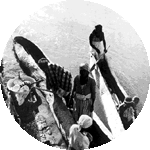
 |
||
 |
Here, in a small, central town on the shores of Lake Kariba (where
tourists go tiger fishing and game viewing) students at Binga
High School surf the net . |
 |
 |

MULONGA LOOP – FOCUS GROUP DISCUSSION
WED 28 AUG 2002 – Binga ITC
(part_2)
Participants :
Mr Jossam Munkuli – Simonga, Siachilaba
Mr Peter Mungombe - Simonga, Siachilaba
Ms Margaret Moombe - Simonga, Siachilaba
Ms Jenet Muzamba - Simonga, Siachilaba
Million Katema – Nyele player, Binga
Mr David Mungombe – playwright, scriptwriter, dramatist, Binga
Ms Penny Yon – Interviewer
Mr Sengamo Ndlovu – Moderator
[Simonga CD played in background, explained purpose of dicussion; Map of loop shown and brief explanations given.]
Penny Yon: It’s interesting that the thought of the music returning from that time is provoking other thoughts of old ways, things that are dying out now.
Sengamo Ndlovu:
The Mulonga Loop through the Binga ITC is a learning experience for me. Without this project there are many things I would not have picked up about the Tonga. Building of Kariba dam was just a story, but here we realise the reality. The Loop takes us back, makes us realize and value Tonga culture, and able to pick up positive things of the past music
It makes people realise that they are a people struggling to survive, under harsh conditions. The ITC will also hopefully bring attention and support with other projects to help people survive.
David Mungombe:
I have been asking myself “What is that music? Is it the same or changed?” I am very interested to listen to it, and it will be of great benefit if it can be brought back, and what can we learn from it? We are picking up things from other people, by interacting with them in different ways; is it (still) the same? We have to be proud of preserving that culture and still be able to share it with the world.
The new generation will benefit, because they are losing it. Gospel and other music cultures - like South African - have influenced the young people, over original Tonga music. Kids now know church music, I was asking some children to sing a Tonga song for me, and all they could sing was church songs. They knew almost no Tonga songs and rhymes. Preservation of the music will benefit the new generation.
Penny Yon: It was interesting to note that after Simonga travelled to Europe and produced a CD, the young people became very interested in Ngomba Buntibe performances, and the CD would play very loud at the Siachilaba shops for many months after their return from Europe.
David Mungombe:
Now Tonga music is reaching out, like the Ndebeles with their imbube [acapella] music, going all over the world. This Tonga music is coming back, and will be given its right recognition, correctly presented. Exposure of Tonga culture will be very good for tourism.
Sengamo Ndlovu:
The lack of interest from youth may possibly be because of the lack of exposure to the music, and lack of resources for horns, drums etc. Two-three years ago there were some young men from the high school here who wanted to started a ngoma buntibe group, but they had no money for instruments. So it died away.
RE COMPOSITIONS & LYRICS
Q: How do the lyrics of the songs come into existence?
A: The composer will have the song, together with the words. Sometimes it can come to him in a dream. Other times it will just be a song in his head. When he teaches it to the musicians, he sings it for them, with words and everything. Then the nyele (horns) take over the melody.
Q: What are the words about?
- Sometimes it is advice for people
- sometimes mockery about someone’s wrong doings
- also for appreciating people (praise songs)
- and warning and reporting about something.
- The composer will write a song about someone and what he has done. He will not face you, but at the end of the day the song will come to face you, without knowing where it came from. Some things are done privately, but reported through song.
Q: Are the composers feared because of this?
A: Ah, they are respected. But there can be many composers, so one will not know where it has come from.
Q: I have noticed that the women only sing a short refrain which is repeated over and over, how then does everyone know about the background story of the song?
A: The composer will have sung the song to teach the musicians. The nyele takes the whole story, the singers will sing the chorus only. But everyone has learned the song.
Q: Is this information-giving something that should be continued, even now with computers and internet technology available?
A: It is very necessary. It is our newspaper. In different areas, each community group will be singing their own songs. When we go there we hear what has been going on, and if they come here, they hear about us. We share information.
MORE DISCUSSION IMMEDIATELY AFTER LOOP BROADCAST.